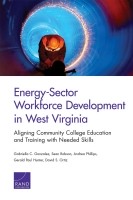| 来源类型 | Research Reports
|
| 规范类型 | 报告
|
| ISBN | 9780833090867
|
| 来源ID | RR-812-NETL
|
| Energy-Sector Workforce Development in West Virginia: Aligning Community College Education and Training with Needed Skills |
| Gabriella C. Gonzalez; Sean Robson; Andrea Phillips; Gerald Paul Hunter; David S. Ortiz
|
| 发表日期 | 2015
|
| 出版年 | 2015
|
| 页码 | 194
|
| 语种 | 英语
|
| 结论 |
The Most Important KSAs (Knowledge, Skills, Abilities) Are Basic Ones- Across high-growth and energy-sector occupations, the abilities cited as most important were English language, mathematics, listening, and critical thinking.
The Candidates for Semiskilled, High-Demand Energy-Sector Positions Are Not Meeting Basic Skills Requirements- Most CTCS students enrolled in non–energy-related courses.
- Nearly half of new students in CTCS energy-related programs needed remedial math courses first.
- Employers note difficulty in finding local talent with necessary skills for energy-sector jobs.
- Lack of employer collaboration in educational and training programs results in misalignment between job requirements and course content.
Students Feel Little Support for Job Placement or Career Counseling from Community and Technical Colleges- Students report that CTCS does not provide formalized internship or apprenticeship opportunities. Students must rely on the personal contacts of individual instructors.
There Are Three Key Characteristics of Successful Partnerships Between Education and Training Providers and Employers- Bridge services focus on increasing job skills and opportunities for low-skilled workers and ensure they develop the personal, academic, and workplace competencies needed to succeed.
- Employer involvement ensures students receive the education required to enter the industry and the training for energy-specific jobs.
- Recognition of and addressing barriers to program implementation keeps geography, transportation issues, and instructor shortages from breaching the workforce-development pipeline.
|
| 摘要 |
- Develop ongoing partnerships among industry leaders, training providers, and other education providers.
- Revise CTCS programs to fit the demands of the energy-sector workplace.
- Leverage workforce-development training programs already in place in CTCS.
- Improve awareness of available energy-sector education and training programs and employment opportunities.
- Institutionalize and formalize internships or cooperative training partnerships, and expand and improve career counseling.
- Make the recruitment and retention of quality instructors a priority for education and training program administrators.
- Improve readiness of talent entering postsecondary education and training programs.
- Provide services to address potential barriers to talent's entrance into, and completion of, education and training programs.
- Integrate basic skills instruction within degree-bearing courses.
- Institutionalize cross-communication and collaboration across state institutions.
|
| 主题 | Education Curriculum
; Educational Institutions
; Employment and Unemployment
; Natural Gas
; Occupational Training
; Postsecondary Education
; STEM Education
; West Virginia
; Workforce Management
|
| URL | https://www.rand.org/pubs/research_reports/RR812.html
|
| 来源智库 | RAND Corporation (United States)
|
| 资源类型 | 智库出版物
|
| 条目标识符 | http://119.78.100.153/handle/2XGU8XDN/108083
|
推荐引用方式
GB/T 7714 |
Gabriella C. Gonzalez,Sean Robson,Andrea Phillips,et al. Energy-Sector Workforce Development in West Virginia: Aligning Community College Education and Training with Needed Skills. 2015.
|
|
文件名:
|
x1495316334361.jpg
|
|
格式:
|
JPEG
|

|
文件名:
|
RAND_RR812.pdf
|
|
格式:
|
Adobe PDF
|
除非特别说明,本系统中所有内容都受版权保护,并保留所有权利。